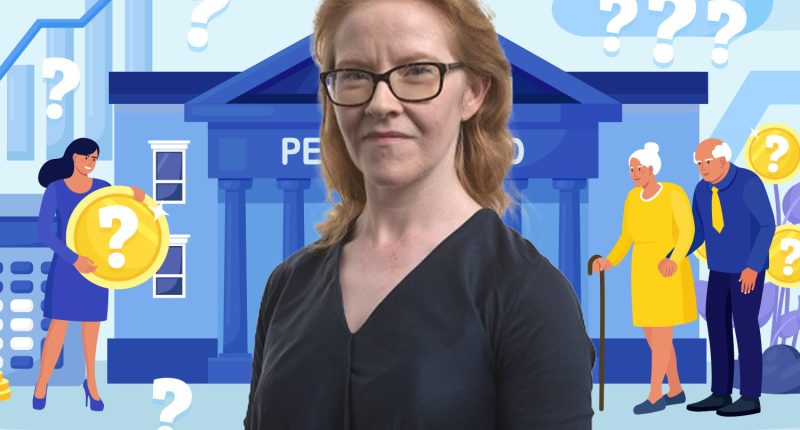IT can be difficult to get your head around pensions, especially if you’ve just started thinking about retirement.
Understanding how much you need, how much you’ll actually get and how long it needs to last can be tricky.
All the complicated details can often leave you with more questions than answers, which is why we picked the brain of one of the experts.
Helen Morrissey is the head of retirement analysis at Hargreaves Lansdown and has heard it all when it comes to pensions.
Helen said: “Retirement is a complex area, beset by myths and confusion that can get in the way of people really engaging with their pension planning.
“There is information everywhere but knowing where to go to get guidance you trust can be hard to identify.
READ MORE IN MONEY
“Going online for instance can bring up a whole host of out-of-date and inaccurate information that could cause you problems if you based your retirement decisions on it.”
Yet Helen says the internet is still an important source that could help confused Brits, but there are specific ones to engage with.
She said: “Check with your pension provider or employer about what retirement education material they can offer, because many host a variety of information such as webinars, planning tools and articles to boost your knowledge.
“Similarly, there are great government sources in the form of the Moneyhelper website and the Pension Wise service, which delivers telephone and face-to-face guidance sessions for the over 50s.”
Most read in Money
Accessing the “right support at the right time” can make a big difference in your retirement, Helen added.
Helen checked key pension-related questions being asked online using Google data and found 630,000 searches for how much cash you need for retirement.
More than 6.5million questions were asked about the state pension, 784,000 on annuity and around 717,000 on SIPP.
Helen has answered these five questions to help you have a better understanding of the retirement process.
How much do I need to retire?
How much you need to retire comfortably is one of the most searched topics, according to Helen.
And it doesn’t really have a straightforward answer either,
She explained that the Pensions and Lifetime Saving Association (PLSA) has come up with its Retirement Income Standards, which can serve as a useful rule of thumb.
Helen said: “According to the PLSA, a minimum standard of living – that is an income that covers your basics with a small amount left over for things like occasional meals out – would cost £12,800 per year for a single person and £19,900 for a couple.
“If you want more flexibility in retirement such as the ability to run a car or go on a foreign holiday every year, then a moderate standard of living will cost around £23,300 per year for a single person and £34,000 for a couple.”
Meanwhile, a comfortable standard of living with extra holidays and theatre trips is likely to cost £37,300 for a single person and £54,500 per year for a couple.
All of these figures include the state pension which is £10,600 a year at the moment if you get the full amount.
Helen continued: “When the standards were published, the PLSA said to achieve a moderate income in retirement a couple sharing costs with each in receipt of the full new state pension would need to accumulate a retirement pot of £121,000 each, based on an annuity rate of £6,200 per £100,000.”
While for a comfortable level, each partner’s pension would need to be £328,000.
It’s important to note that annuity rates do fluctuate so you may get more or less for your money depending on when you decide to purchase one.
How much state pension will I get?
While 6.5million people searched about the state pension, there were more than 7.5million searches if you add in related areas such as Pension Credit.
It goes to show how complex the areas surrounding pensions are and how difficult they are to navigate.
Helen explained: “A full new state pension is currently £203.85 per week.
“To qualify for any state pension, you need to have 10 years of National Insurance contributions on your record and for the full amount you need to have 35 years’ worth.”
To check how much you are on track to receive, it’s a good idea to get a state pension forecast on the gov.uk website.
This will also highlight any gaps in your record that may need to be filled.
Helen added: “If you have gaps you can check to see if you were eligible for a benefit such as Child Benefit during that time, which comes with a free National Insurance credit, and if so, you may be able to backdate a claim.
“You can also pay for voluntary National Insurance credits to plug the gaps.”
But Helen did point out that it’s really important that you check with the DWP before handing over any money to make sure you will benefit.
She added that many are affected by contracting out, which was a feature of the old pension system.
It has since been abolished but many will still get a lower state pension as a result.
Under contracting out you opted out of the so-called state second pension.
“You paid less NI, which may affect your state pension entitlement, but in return you could receive extra from your workplace or personal pensions instead,” Helen said.
It may be the case that even paying for extra NI contributions won’t boost your state pension amount so make sure to check before paying.
What is a SIPP?
More than 700,000 people googled SIPP, so what actually is it?
Helen explained: “A SIPP is a self-invested personal pension plan.
“It differs from some other pensions in that you are in the driving seat when it comes to choosing and managing your investments.
“In other personal and workplace pensions, members will often rely on the provider to decide where they are invested via a default fund.”
With a SIPP, the choice of where to invest is up to you.
“SIPPs offer a wider range of investments than other personal and workplace pensions do,” she said.
There are several providers out there, like Hargreaves Lansdown and AJ Bell, so if you think a SIPP is right for you take a look at the market and compare different deals.
What is an annuity?
Annuities have made a comeback in recent years, prompting almost 800,000 searches on what an annuity is.
Helen explained: “Basically, an annuity is an insurance product that lets you exchange your pension savings for a guaranteed income for life.
“Once bought they cannot be unwound and so it’s really important to make sure it’s right for you, and to include as much information as possible in your application to make sure you get the annuity that best meets your needs.”
For example, you can get annuities that will keep paying out an income to your spouse when you die – these are known as joint life annuities.
You can also get an enhanced annuity that takes account of your health and lifestyle, and you may get an increased income as a result.
Helen added: “Different providers offer different rates so it’s really important that you look across the market to get the best deal and you can use annuity quote comparison services to get a sense of what the different providers offer.”
Data from HL’s annuity search engine showed a 65-year-old with a £100,000 pension could get up to £4,941 per year from an annuity two years ago but would be able to get up to £7,436 today.
It means they’re definitely worth having a look into.
How long does my pension need to last?
Anyone approaching retirement or who has only just started thinking about it will want to know exactly how long their pension will need to last them.
The answer is probably longer than you think, according to Helen.
She said: “Recent ONS data showed the number of centenarians is on the rise.
“According to the data on Census Day in 2021, there were 13,924 centenarians (aged 100 or older) living in England and Wales, a 24.5% increase from 2011. “
Babies born in 2021 have a life expectancy at birth projected to be 90.5 years for females and 87.6 years for males.
So you could potentially be living 30 or even more years in retirement, depending on what the age is at the time.
Read More on The Sun
Meanwhile, a pensions expert has revealed her secret for boosting your retirement pot by up to £128,000.
Plus, Brits planning their retirement could do so early with a little-known bank account, experts have revealed.
Do you have a money problem that needs sorting? Get in touch by emailing [email protected].
You can also join our new Sun Money Facebook group to share stories and tips and engage with the consumer team and other group members.
This post first appeared on thesun.co.uk










